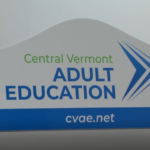
BURLINGTON, Vt. (WCAX) – With almost 1,500 students in adult education programs statewide, program directors say the services are still needed but underfunded.
Vermont has 17 adult education programs to help adults and high school-aged students get their diplomas. The number of adult students seeking education fluctuates, but the needs of those students have increased. That’s according to a new report to the legislature to clarify the governance and funding of adult education programs.
Montpelier High School senior Sadie Bothwell is one student using adult education programming, who had to take time off at the beginning of high school.
“I knew that I had to make up credits and fill in those gaps,” she said.
Bothwell learns with the Center for Adult Education for instruction focused on math. She’s one of 305 students statewide taking high school completion courses to get her diploma. Now, she’s able to look towards the future with excitement.
“I thought that graduation would be a really hard thing to reach. And so since I’m getting there, and I know that it’s attainable, and it’s going to happen, I have been thinking about those next steps. I would love to go to a university to study political science,” Bothwell said.
Catherine Kalkstein of Central Vermont Adult Education said, “COVID-19 really sort of ramped up that need, in terms of, you know, some students just don’t feel comfortable going back into the high school setting, it’s been very challenging. And so they’re looking for an alternative way.”
CVAE is part of a push to get the high school completion program more funding, which they say has gone down 50 percent in the past 8-10 years. They say there are over 30,000 Vermonters over 18 without a high school credential. Adult Ed is funded federally and on the state level, and they say 70 percent is funded by the state through reimbursements.
Brian Kravitz of CVAE said, “Our best case scenario is that our funding grows over time to meet the needs of inflation, the business, we had not received an increase in funding in well over 20 years.”
The report to the legislature recommends in part the state modernize the formula to distribute adult education funds equitably.
Representative Marc Hihaly on the Committee on Appropriations said, “This is a program operating on a shoestring and it really needs to be well funded. And I think the amount of money involved is about a little north of $6 million. So the real question is, how do we do that? And where does the money come from?”
Hihaly notes a significant portion of funding comes from the education fund, with a balance from the general fund. He says there are conversations just beginning in the House Education Committee about what this new balance would be.
“We need a system that meets these people where they are. And that’s adult education is a part of that,” he said.
After a few years of testimony, the legislature gave adult education one-time extra funding of $350,000 last session, with this report issued to pinpoint where funding could be allocated to make the programming more secure.
